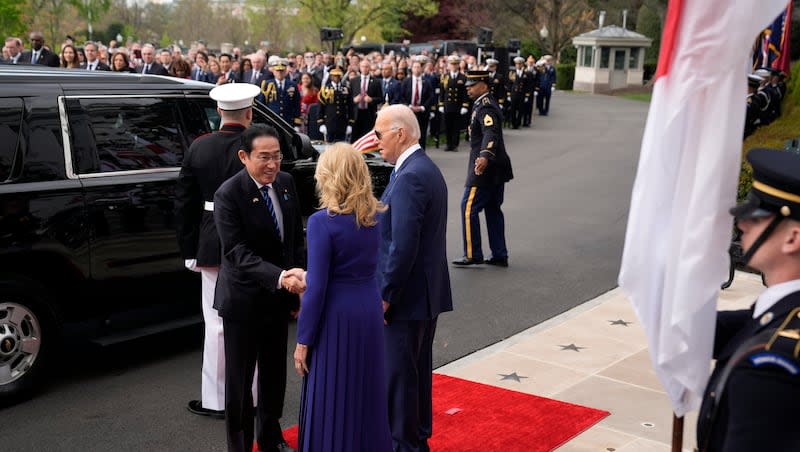Biden meeting with Japanese prime minister at White House

- Oops!Something went wrong.Please try again later.
- Oops!Something went wrong.Please try again later.
- Oops!Something went wrong.Please try again later.
Ahead of President Joe Biden’s summit with Japanese Prime Minister Fumio Kishida, Sen. Mitt Romney joined a bipartisan group of senators to introduce a resolution touting the strength and importance of the United States-Japan alliance.
The resolution reaffirms what the senators say is the vital role that the U.S.-Japan alliance plays as a cornerstone for peace, security and prosperity and underscores the unwavering commitment of the United States to Japan and the Indo-Pacific region.
“Our alliance with Japan is fundamental to peace and stability in the Indo-Pacific region,” Romney, R-Utah, said in a statement. “At a time of growing military aggression by China in the Taiwan Strait and the South China Sea, the United States must remain committed to strengthening diplomatic ties and security cooperation with Japan and work toward our shared strategic interests.”
Kishida is in Washington this week for his first official state visit as prime minister. On Thursday, he will address a joint meeting of Congress, becoming only the second Japanese prime minister to have that honor. Kishida and Biden also will meet with Philippines President Ferdinand Marcos Jr. to discuss Chinese incursions in the South China Sea.
New defense agreement
CBS News reported Biden and Kishida are expected to announce an increased level of defense and intelligence cooperation between the two countries, citing senior administration officials.
“President Eisenhower said his goal was to establish an indestructible partnership between our countries,” Biden said. “Today, the world can see, that goal has been achieved, and that partnership between us is unbreakable.”
Defense Secretary Lloyd Austin and his Japanese counterpart will work out the details of the enhanced military partnership in the next several months, the senior administration officials said. The U.S., though, expects Japan to step up and play a significant role in producing more military and defense equipment, per CBS.
Biden welcomed Kishida to the White House on Wednesday to showcase a strong and growing partnership focused on joint defense cooperation to deter an aggressive China, according to Reuters. The summit kicked off with an official arrival ceremony on the White House South Lawn, followed by a closed-door meeting, a joint news conference planned for the Rose Garden, and a performance by musician Paul Simon.
Cherry blossoms
Biden and Kishida strolled across the White House lawn on Tuesday night to admire three Japanese cherry trees. Japan’s gift of 3,000 cherry trees more than 100 years ago is a symbol of the alliance between the two countries.
“Ours is truly a global partnership. For that, Mr. Prime Minister Kishida, I thank you,” Biden said. “Now our two countries are building a stronger defense partnership,” and stronger Indo-Pacific than before.
Kishida, speaking after Biden, said the cherry trees that line the Tidal Basin near the White House are a “symbol of the friendship between Japan and the United States.”
“As a global partner, Japan will join hands with our American friends and together we will lead the way in tackling the challenges of the Indo-Pacific and the world,” he said.
CNN reported that Biden and Kishida are expected to announce a commitment to change the U.S. force structure in Japan to improve how Japanese and U.S. forces are integrated, establish a “military industrial council” to evaluate where the two countries can co-produce defense weapons to improve cooperation, and items related to integrating anti-missile defense between the U.S. Australia and Japan, citing administration officials.
The U.S. has about 55,000 troops stationed in Japan at more than half a dozen bases and other facilities.
Resolution recognizing U.S.-Japan alliance
The senators sponsoring the resolution say the U.S.-Japan Alliance is one of the most important diplomatic, economic, technological and military alliances in the world and a positive force in the Indo-Pacific.
Provisions in the proposed bipartisan resolution:
Reaffirms the United States’ extended deterrence commitments to Japan.
Commits to strengthening and deepening U.S.-Japan diplomatic, economic, security and people-to-people ties.
Acknowledges that 2024 marks the 64th anniversary of the signing of the Treaty of Mutual Cooperation and Security Between the United States and Japan.
Applauds Japan’s recent historic steps to modernize its national security and defense policy, including its commitments to increase defense spending.
Celebrates and encourages continued close coordination between the United States, the Republic of Korea and Japan to address shared challenges.
Recognizes Japan’s strong support for Ukraine since the beginning of Russia’s unprovoked invasion.
Imprisoned Navy officer released
Last year, Utah GOP Sen. Mike Lee delivered an ultimatum to Kishida on social media to release then-imprisoned Navy Lt. Ridge Alkonis, saying “you’ve got really good security arrangement with the United States, and you’ve had the luxury of not having that arrangement discussed or seriously questioned in Congress for a long time. That’s about to change.”
Lee continued, “Why would you rock the boat by throwing one of our best and brightest in prison for three years — all because of a car accident that, tragic as it was, resulted from a non-foreseeable medical emergency.”
Japan released Alkonis to U.S. custody last December after he was held in a Japanese prison for 17 months for his role in a car crash that killed two people near Mount Fuji. The U.S. Parole Commission released Alkonis from custody in January.
Alkonis said he lost consciousness after driving down from a hike on the famous mountain and may have suffered from altitude sickness, but a Japanese judge decided that Alkonis had fallen asleep at the wheel and lost control of his vehicle, which plowed into pedestrians and parked cars in a restaurant parking lot on May 29, 2021, and led to the deaths of an 85-year-old Japanese woman and her 54-year-old son-in-law.

